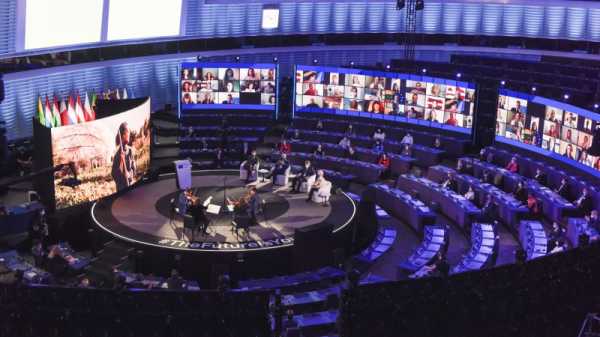
Citizen assemblies can strengthen citizen participation in the EU, but their importance should not be overstated, writes Nils Meyer-Ohlendorf.
Dr Nils Meyer-Ohlendorf is the head of International and European Governance at the Ecologic Institute.
Citizen assemblies are in high demand – also in the EU. The European Commission wants citizen assemblies to draft future recommendations for key EU legislative projects. The European Parliament is pushing in the same direction. It seems likely that citizen assemblies will become an integral part of the EU decision-making.
Is this a good idea? What lessons can be learned from the EU Citizen Assemblies?
At the Conference on the Future of Europe, citizen assemblies – so-called European Citizen Panels – took centre stage. Composed of 800 citizens randomly selected from all Member States, these panels developed recommendations on all topics relevant to the future of Europe – spanning climate protection, labour market policy to foreign policy. These recommendations shaped the outcome of the conference. In this respect, the panels were a success.
But the panels also had weaknesses. Panels and the citizens of Europe were all too often conflated. “The citizens of Europe have spoken and are now being heard” has been a frequent statement. Their proposals reflect the expectations of European citizens. As a quasi-expression of the electorates’ will, recommendations have to be implemented. This rhetoric problematically overstates the importance of the panels.
Indeed, citizen panels are supposed to reflect the multifaceted composition of society. Unelected, however, they cannot represent the people. In the absence of democratic legitimacy, they cannot claim that their proposals are implemented. For the most part, the members of the Citizen Panels were well aware of this fact, but some politicians were quick to exclaim that they had heard the Europeans´ wishes and shall now carry them out.
This makes disappointments inevitable – whenever recommendations are not implemented. Instead of providing for an additional exchange between the representatives and the represented, it only fuels the narrative of the “high-ups” being detached from the public. Moreover, confusion arises when some of the conference’s outcomes are explicitly based on recommendations made by the Citizens’ Panels while others are not. Does this mean that some proposals are more legitimate than others? Importantly, this question concerns issues as relevant as the direct election of the President of the Commission.
The exaggerated rhetoric also suggests that citizen panels are the ultimate form of citizen participation in the EU – that they are the missing link between the politicians and the public. Panels are made to elevate democracy in the EU to a new, i.e. better, level.
This hyperbole glosses over other forms of public participation. Participation in political parties, citizens’ movements such as Fridays for Future, the European Citizens’ Initiative and public consultations remain unmentioned. The narrow focus on Citizens’ Panels also suggests that without them, democracy in the EU would remain stuck in an outdated state. And that without them, there would be no honest dialogue between citizens and politicians. The baby is thrown out with the bathwater.
Lastly, the topic of “the Future of Europe” was too broad. Given such a vast topic, the development of concrete and thus action-oriented recommendations was hard. As a result, many recommendations were general and reiterated already existing EU decisions, resulting in little added value for the EU.
With this in mind, four lessons emerge if Citizens’ Panels are to be given a permanent voice in EU decision-making.
First: Politicians must be more honest and assertive in stating what citizens’ panels really are: Advisory bodies, not substitute parliaments. While they complement other forms of citizen participation, they do not represent the people.
Second: For the recommendations to add practical value, citizens’ panels should address narrowly defined topics. Citizens’ panels for specific legislative projects – as planned by the Commission – are one option for narrowing down topics. Citizens’ panels on the strategic direction of the EU, on the other hand, are at risk of drifting into abstract statements.
Third: To ensure that participation in the EU legislative process is timely and focused on specific issues, citizens’ panels should convene following the Commission’s communication but before the Commission’s legislative proposal. To ensure a clear demarcation from the actual legislative decisions, the panels’ work should end with comments on the Commission’s proposal. After the legislative process, the panels should receive publicly and in detail feedback on why specific recommendations were or were not adopted.
Since panels are costly and time-consuming, they should be restricted to the legislative projects which are of strategic importance for the EU and for which panels are likely to advance the debate. Deadlocked issues are a good place to start. The panels should not bog down already slow and complicated legislative process in the EU.
Fourth: Panels ought to be as representative as possible. This means that panels must not only represent a mini-Europe in terms of gender, age, education, and socioeconomic background but also terms of values, political beliefs, and electoral choices.
If these lessons are implemented, citizens’ assemblies can strengthen public participation in the EU. They will complement the other forms of citizen engagement.
Source: euractiv.com



